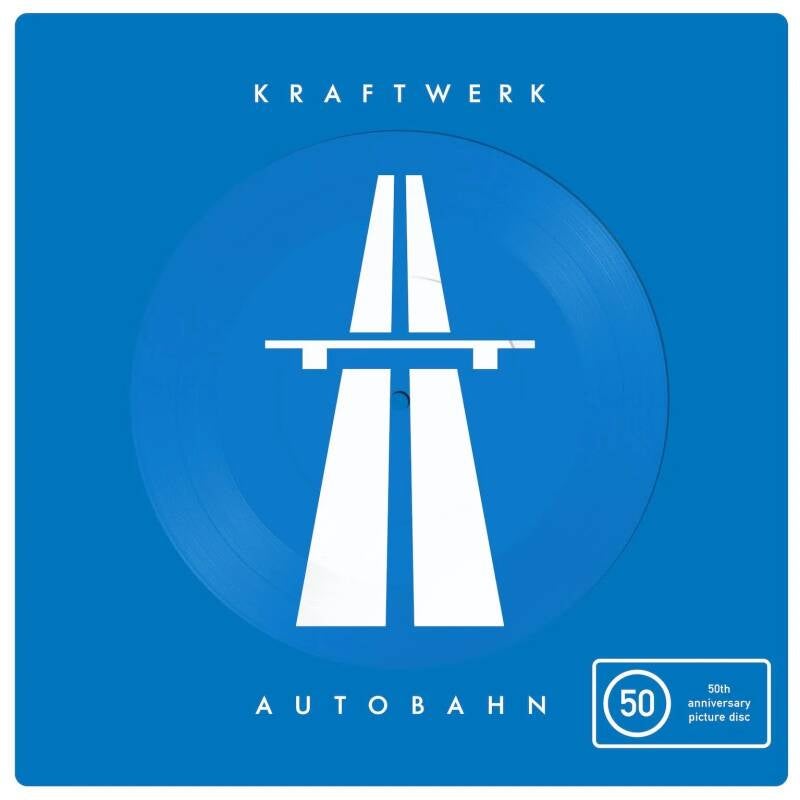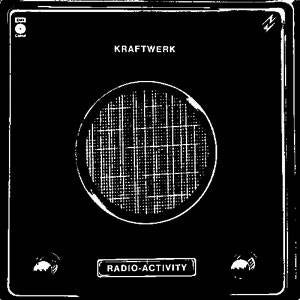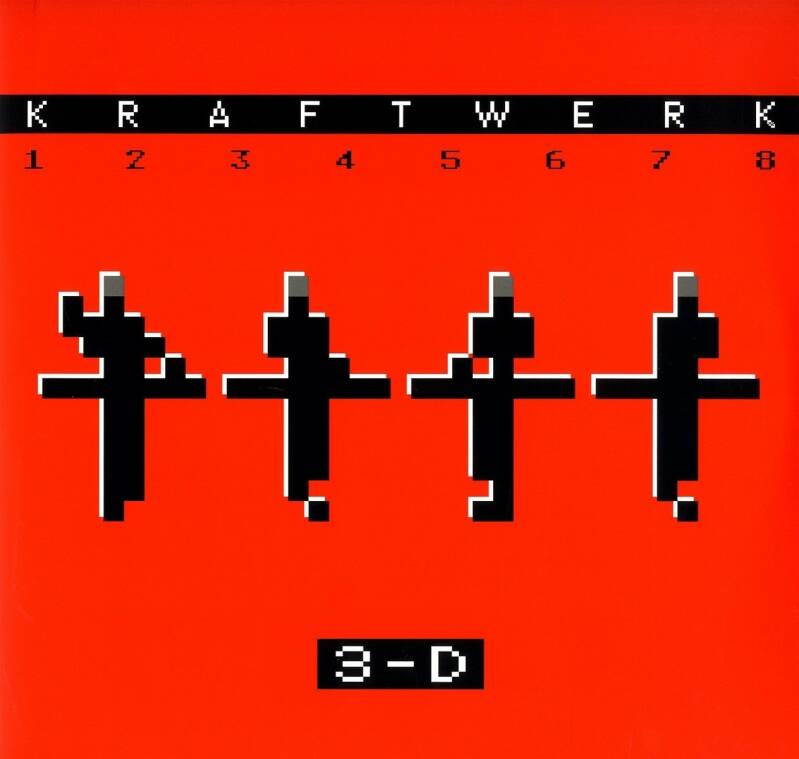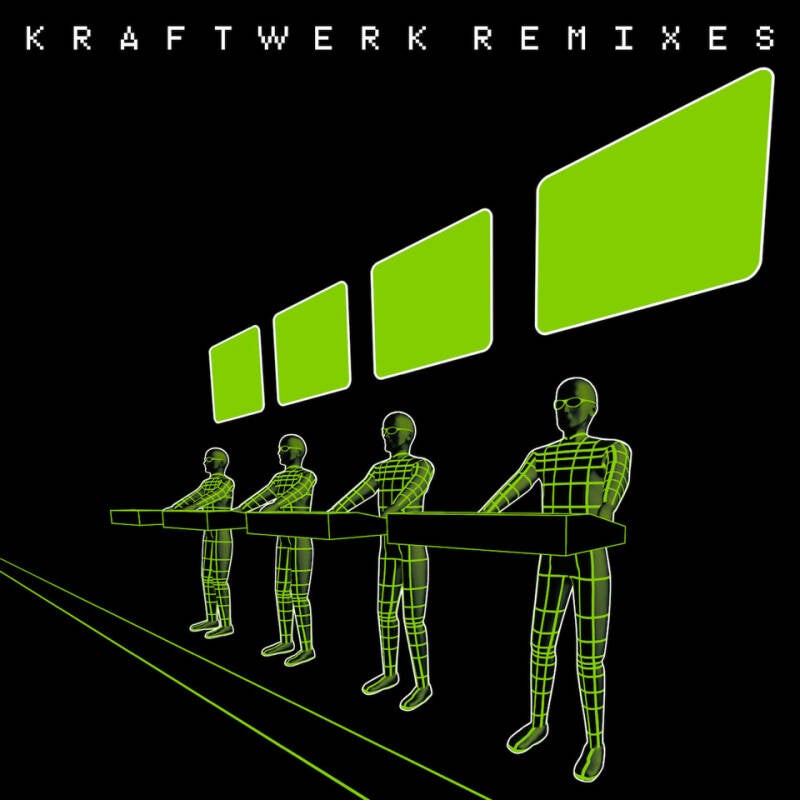
THE STORY OF KRAFTWERK
Florian Schneider and Ralf Hutter met as students in Dusseldorf in the late 1960s, mainly playing experimental music, at the time Schneider played the flute, violin and synthesizer, whilst Hutter played organ and synthesizer. They joined a group called Organisation and released one album called "Tone Float", in 1969, shortly before the group split up.
In 1970 the duo formed Kraftwerk, using various other musicians, in 1970 they released their first album "Kraftwerk", again this was with more traditional instruments, such as, guitar, bass, drums, organ, flute, and violin, certainly not what you would expect from Kraftwerk! 2 years later they released "Kraftwerk 2", both albums being instrumental based. In 1973 Wolfgang Flur joined Kraftwerk, and became part of their live set up, playing rhythm machines and drums. They famously built a home made drum machine!
A further album was released in 1973, called "Ralf & Florian", which made heavy use of synthesizers, and drum machines and was again, an instrumental album, however they did make use of a vocoder.
One notable track that stood out across the 3 early albums, was the track, "Tanzmuzik".
1974 was the major breakthrough year for Kraftwerk, as they released the single "Autobahn", which was a hit in the UK, and elsewhere in Europe and America too, an album of the same name was released in the same year, which included, on side one of the record, a 23 minute version of "Autobahn", a song about German motorway travel, whilst the flip side, included the beautiful "Kommetenmelodie 2", which was also released as a single, and 3 other tracks. The album was mainly electronic, however, a few traditional instruments were also used. The album made the Top 5 in the charts in both the UK and America.
Track listing:
1. Autobahn
2. Kometenmelodie 1
3. Kometenmelodie 2
4. Mitternacht
5. Morgenspaziergang
In 1975 Kraftwerk built their Kling Klang Studio and worked on the album "Radio-Activity", an album that used the concept of radio communication as its main theme. The album was released in October 1975. It was the first album to feature, what people consider to be, the classic Kraftwerk line-up, as Karl Bartos became a member of the band, joining Hutter, Schneider and Flur.
The only single to be released from the album, was the title track "Radio-Activity", it didn't make the charts at all, in the UK or in America, but was a minor hit in France, Belguim and Italy.
Track listing:
1. Geiger Counter
2. Radioactivity
3. Radioland
4. Airwaves
5. Intermission
6. News
7. The Voice Of Energy
8. Antenna
9. Radio Stars
10. Uranium
11. Transistor
12. Ohm Sweet Ohm
In the latter half of 1976 the band recorded the album "Trans Europe Express", which demonstrated the more melodic side of Kraftwerk, with tracks like "The Hall Of Mirrors", "Showroom Dummies" and "Europe Endless", and of course the album featured the classic title track "Trans Europe Express", the album was warmly received and demonstrated Kraftwerk's excellent use of sequencers and rhythm machines.
The album was released in 1977, and EMI Records hired a train with old-fashioned carriages from the 1930s to travel from Paris to Rheims, while the songs from the album, were played over the train's announcement system, for the critics and reviewers.
The title track was released as a single, and whilst it didn't make the charts in the UK, it did reach number one in the French singles chart.
Track listing:
1. Europe Endless
2. The Hall Of Mirrors
3. Showroom Dummies
4. Trans-Europe Express
5. Metal On Metal
6. Abzug
7. Franz Schubert
8. Endless Endless
In May 1978 the band released the album "The Man Machine", which included their biggest hit "The Model" and also, the singles "The Robots" and "Neon Lights", the latter reaching number 53 in the UK Singles chart.
This was the first Krafwerk album that featured Karl Bartos credited as a songwriter. The album failed to dent the UK album charts at the time, although it did make the top 20 in several european album charts, however, the album did reach number 9 in the UK album chart in early 1982.
The album received great critical acclaim, and is widely regarded, as being a big influence on early 1980s synthpop.
Track listing:
1. The Robots
2. Spacelab
3. Metropolis
4. The Model
5. Neon Lights
6. The Man Machine
Kraftwerk's next album "Computer World", released in 1981, really cemented Kraftwerk as the pioneers of electronic music, the album is regarded as one of the most influencial to come out of the electronic music scene, in the 1980s. The album embraces computer technology as its concept and touched on subects, such as computer dating ("Computer Love") and using a computer at home ("Home Computer" and "It's More Fun To Compute"), what you have to bear in mind, is that back then, nobody had home computers!! That's how forward thinking Kraftwerk had become.
The first single released from the album was "Pocket calculator", which they recorded in different languages, German, French, Japanese, Italian and of course English. The second single to be released was an edited down version of "Computer Love", which featured the B Side "The Model", radio stations started playing the B Side more and more, so much so, the single was re-released as a double A-Side, a masterstroke as it gave Kraftwerk their biggest international hit, "The Model" reached number one in the UK singles chart in February 1982, as for the album "Computer World", that reached number 15 in the UK album charts.
Track listing:
1. Computer World
2. Pocket Calculator
3. Numbers
4. Computer World 2
5. Computer Love
6. Home Computer
7. It's More Fun To Compute
In 1982 Kraftwerk began to work on a new album, that initially, had the working title Technicolor, but due to trademark issues, was changed to Techno Pop. One of the songs recorded for the album was, "Tour De France", which was released as a single in 1983. During this period the band became obsessed with cycling with Ralf Hutter encouraging the group to take up cycling. Initially Hutter wanted to record a whole album using cycling as the concept, however, other members of the band were not convinced about the idea.
In the early summer of 1982, Ralf Hutter was involved in a serious cycling accident and suffered head injuries and remained in a coma for several days. During 1983 Wolfgang Flür was spending less time in the studio, as the band were using sequencers, therefore, his role as a drummer was becoming less frequent. He left the band and was replaced by Fritz Hilpert.
The album was finally released in 1986, with the title changed to "Electric Cafe", however, when it was re-released in 2009, the title was changed to "Techno Pop". The album performed poorly in the UK album chart, only peaking at number 58.
Two singles were released from the album, "Musique Non Stop" and "The Telephone Call", the former only reached number 82 in the Uk singles chart, whilst the latter only reached number 89 in the UK singles chart.
Track listing:
1. Boing Boom Tschak
2. Techno Pop
3. Musique Non-Stop
4. The Telephone Call
5. Sex Object
6. Electric Café
Kraftwerk's next album release was the remix album "The Mix", that came out in June 1991, the album featured new mixes of some of their most popular tracks, including "Autobahn", "Computer Love", "Pocket Calculator", "Radioactivity", "The Robots" and "Trans Europe Express". No new songs were recorded for the album, which left people somewhat disappointed. Prior to recording this album, Karl Bartos left the group and was replaced by Fernando Abrantes, who was part of the live set up for the tour the band embarked on to promote "The Mix" album, shortly after Abrantes was replaced by Henning Schmitz, who also was part of the live set up towards the end of the tour.
Two singles were released off the album, a new version of "The Robots" and a new version of "RadioActivity", the reworked version of "Radio Activity" reached number 43 in the UK singles chart, whilst the new version of "The Robots" faired better reaching number 20 in the UK singles chart.
The album peaked at number 15 in the UK album chart
Track listing:
1. The Robots
2. Computer Love
3. Pocket Calculator
4. Dentaku
5. Autobahn
6. Radioactivity
7. Trans Europe Express
8. Abzug
9. Metal On Metal
10. Home Computer
11. Music Non Stop
In July 1999, the single "Tour De France" was re-released and reached number 69 in the UK singles chart, it was released on both 12 inch vinyl and on CD. Later that year they released a single called "Expo 2000", which reached number 27 in the UK singles chart, in November 2000 the track was remixed and released as "Expo Remix".
After a 17 year wait for new material, the band released the album "Tour De France Soundtracks", in 2003, it was an album Ralf Hutter wanted to record at the time they were working on the "Electric Cafe" album. The new album was all about the Tour De France cycle race. The album featured a new recording of "Tour De France", as well as, the singles, "Tour De France 03", "Aerodynamik" and "Elektro Kardiogramm" (promo single only).
"Tour De France 03", reached number 20 in the UK singles chart, whilst, "Aerodynamik" reached number 33. The album made number 21 in the UK album chart and they also gained their first number 1 album, in the German album chart. It failed to make the Top 200 Billboard album chart in the states.
Track listing:
1. Prologue
2. Tour de France Etape 1
3. Tour de France Etape 2
4. Tour de France Etape 3
5. Chrono
6. Vitamin
7. Aerodynamik
8. Titanium
9. Elektro Kardiogramm
10. La Forme
11. Regeneration
12. Tour De France
In June 2005 Kraftwerk released their first official live album called Minimum Maximum, which was recorded and filmed on the tour to promote the "Tour De France Soundtracks" album, which they undertook in 2004. The album contained reworked tracks from existing studio albums, from "Autobahn" through to "Tour De France Soundtracks", it also included the song "Planet of Visions" that was a reworking of "Expo 2000".
It was announced in 2008, that Florian Schneider had quit Kraftwerk and was replaced by video technician Stefan Pfaffe.
In 2009, Kraftwerk released a remastered box set of their albums, called "The Catalogue", this featured every album from "Autobahn" to "Tour De France Soundtracks". To support the release the band played various concerts in Europe and presented a 3-D experience show, the audience were able to watch this multimedia part of the show with 3D glasses, which were given out. They have continued to present 3-D shows across the world since, and in 2017 they surprised fans and critics by releasing an 8 CD live set, called "3D - The Catalouge". This was a complete set of new live recordings of each of their well known albums. A 4 disc Blu-Ray set was also released, which has stunning sound, the release also won awards.
Sadly on May 6th 2020, it was announced that Co-Founder of Kraftwerk, Florian Schneider, had passed away after a short battle with cancer.
In April 2022 Kraftwerk announced the release of "Remixes", a 2 CD/3LP collection of remixes of tracks mainly from "The Mix" era and beyond, which included a new track called "Non Stop" and a new edit of the track "Home Computer".
Track Listing:
CD1
1. Non Stop
2. Robotnik (Kling Klang Mix)
3. Robotronik (Kling Klang Mix)
4. Radioactivity (William Orbit Hardcore Remix – Kling Klang Edit)
5. Radioactivity (François Kervorkian 12” Remix)
6. Expo Remix (Kling Klang Mix 2002)
7. Expo Remix (Kling Klang Mix 2001)
8. Expo Remix (Orbital Mix)
9. Expo Remix (François K + Rob Rives Mix)
10. Home Computer (2021 Single Edit)
CD2
1. Expo Remix (DJ Rolando Mix)
2. Expo Remix (Underground Resistance Mix)
3. Expo Remix (UR Thought 3 Mix)
4. Aéro Dynamik (Kling Klang Dynamix)
5. Aéro Dynamik (Alex Gopher / Étienne de Crécy Dynamik Mix)
6. Aéro Dynamik (François K. Aero Mix)
7. Aéro Dynamik (Intelligent Design Mix by Hot Chip)
8. La Forme (King Of The Mountains Mix by Hot Chip)
9. Tour De France (Etape 2)
In February 2025, Kraftwerk announced that a picture disc vinyl edition would be released to celebrate the 50th anniversary of the album "Autobahn", in addition a new Dolby Atmos Blu-Ray disc was also to be released featuring the entire "Autobahn" albumn plus 2024 radio edits of the tracks "Autobahn" and "Kommetenmelodie 2".

Track Listing For Vinyl Picture Disc:
1. Autobahn
2. Kometenmelodie 1
3. Kometenmelodie 2
4. Mitternacht
5. Morgenspaziergan
Dolby Atmos Blu-Ray Track Listing:
1. Autobahn
2. Kometenmelodie 1
3. Kometenmelodie 2
4. Mitternacht
5. Morgenspaziergang
Bonus audio:
Autobahn (2024 edit)
Kometenmelodie 2 (2024 edit)
We can only hope that we will see a new Kraftwerk studio album at some point, after all, it has been 17 years since they released their last studio album!











